译林版六上Unit3语法与练习
新译林英语六年级上册语法知识+练习
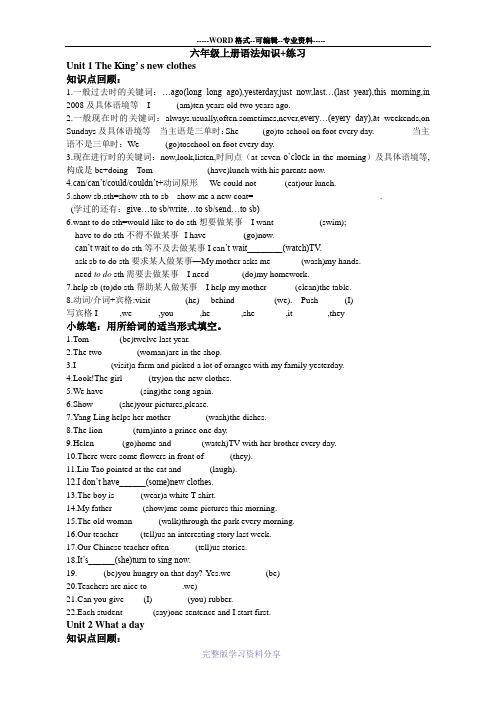
六年级上册语法知识+练习Unit 1 The King’ s new clothes知识点回顾:1.一般过去时的关键词:…ago(long long ago),yesterday,just now,last…(last year),this morning,in 2008及具体语境等---I______(am)ten years old two years ago.2.一般现在时的关键词:ually,often.sometimes,never,every…(eyery day),a t weekends,on Sundays及具体语境等---当主语是三单时:She _____(go)to school on foot every day.-------------当主语不是三单时:We______(go)toschool on foot every day.3.现在进行时的关键词:now,look,listen,时间点(at seven o’cloc k in the morning)及具体语境等,构成是be+doing---Tom ____________(have)lunch with his parents now.4.can/can’t/could/couldn’t+动词原形----We could not ______(eat)our lunch.5.show sb.sth=show sth to sb---show me a new coat=_____________________________.(学过的还有:give…to sb/write…to sb/send…to sb)6.want to do sth=would like to do sth想要做某事---I want __________(swim);have to do sth不得不做某事--I have ________(go)now.can’t wait to do sth等不及去做某事I can’t wait________(watch)TV.ask sb to do sth要求某人做某事—My mother asks me_______(wash)my hands.need to do sth需要去做某事---I need _______(do)my homework.7.help sb (to)do sth帮助某人做某事---I help my mother ______(clean)the table.8.动词/介词+宾格:visit________(he)----behind_________(we).---Push______(I)写宾格I_____,we______,you______,he_______,she_______,it________,they_________小练笔:用所给词的适当形式填空。
译林版英语六年级上册Unit 3 知识梳理与练习
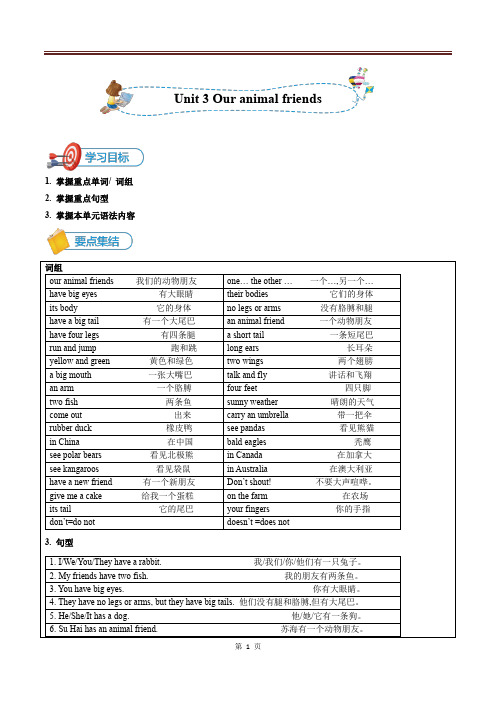
Unit 3 Our animal friends1. 掌握重点单词/ 词组2. 掌握重点句型3. 掌握本单元语法内容词组our animal friends 我们的动物朋友one… the other … 一个…,另一个…have big eyes 有大眼睛their bodies 它们的身体its body 它的身体no legs or arms 没有胳膊和腿have a big tail 有一个大尾巴an animal friend 一个动物朋友have four legs 有四条腿 a short tail 一条短尾巴run and jump 跑和跳long ears 长耳朵yellow and green 黄色和绿色two wings 两个翅膀a big mouth 一张大嘴巴talk and fly 讲话和飞翔an arm 一个胳膊four feet 四只脚two fish 两条鱼sunny weather 晴朗的天气come out 出来carry an umbrella 带一把伞rubber duck 橡皮鸭see pandas 看见熊猫in China 在中国bald eagles 秃鹰see polar bears 看见北极熊in Canada 在加拿大see kangaroos 看见袋鼠in Australia 在澳大利亚have a new friend 有一个新朋友Don’t shout! 不要大声喧哗。
give me a cake 给我一个蛋糕on the farm 在农场its tail 它的尾巴your fingers 你的手指don’t=do not doesn’t =does not3. 句型1. I/We/You/They have a rabbit. 我/我们/你/他们有一只兔子。
2. My friends have two fish. 我的朋友有两条鱼。
译林版英语六年级上册unit3 知识梳理与练习
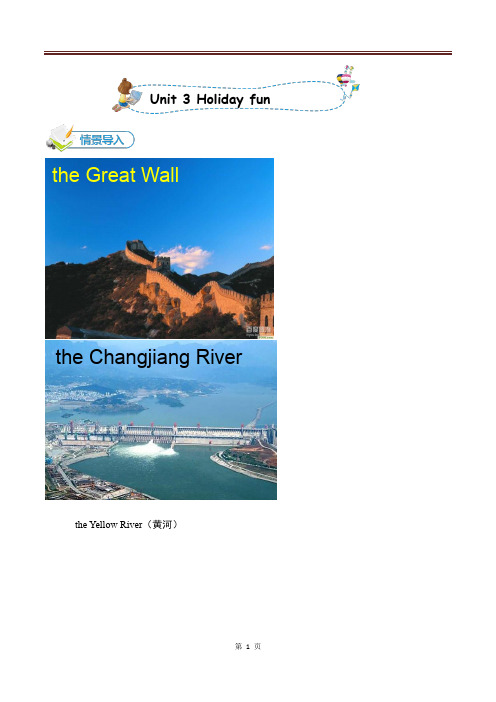
Unit 3 Holiday funthe Great Wallthe Changjiang Riverthe Yellow River(黄河)the Bund (外滩)【词汇】1. holiday 假日,假期2. National Day 国庆节3. call 打电话4. bund (上海)外滩5. Shanghai Museum 上海博物馆6. star 星星7. Great Wall 长城8. Palace Museum 故宫9. Summer Palace 颐和园10. Tian’anmen Square 天安门广场11. fashion show 时装表演12. excited 激动的,兴奋的13. paper 纸14. ask 问15. bottle 瓶子16. go well 进展顺利17. at first 开始,最初18. heavy rain 大雨19. museum 博物馆20. square 广场21. lake 湖泊22. fashion时尚的,时髦的23. cool 酷,真棒注:红色单词为旧教材3A——5B没有的而本课中出现的生词。
【词组或短语】1. National Day 国庆节2. (the) Shanghai Museum 上海博物馆3. (the) Great Wall 长城4. (the) Palace Museum 故宫5. (the) Summer Palace 颐和园6. Tian’an men Square 天安门广场7. fashion show 时装表演,时装秀8. go well 进展顺利9. at first 开始,最初10.heavy rain 大雨11. holiday fun 假日快乐12. come back to school回到学校13. after the National Day holiday国庆假日之后14. call you打电话给你15. at home 在家16. go to Shanghai去上海17. visit my aunt拜访我的阿姨18. go to the Bund去外滩19. visit the Shanghai Museum参观上海博物馆20. see many interesting things看见许多有趣的事21. How was your holiday? 你的假日怎么样22. great fun有趣的事23. our family我们全家24. go to a farm去农场25. near Star Lake在星星湖边26. pick some oranges摘一些橘子27. go fishing去钓鱼28. catch a big fish钓了一条大鱼29. want to give you the fish想要把鱼给你30. pick an orange for me为我摘只橘子31. talk about your travel experiences 谈论你的旅游经历32. want an orange from the tree想要树上的一只橘子33. three main school holidays三个主要的学校假日34. in the UK在英国35. the Easter holiday复活节假期36. the summer holiday暑假37. the Christmas holiday圣诞假期38. It is time for dinner. 该吃晚饭了。
六年级上册英语 -各单元知识点详解 译林版(三起)
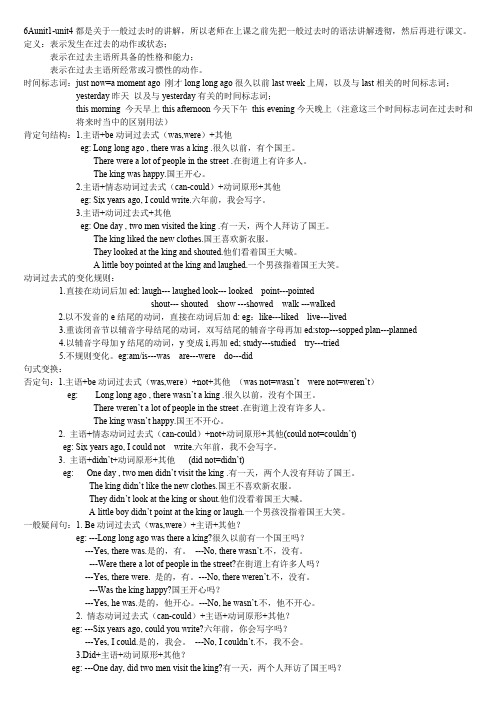
6Aunit1-unit4都是关于一般过去时的讲解,所以老师在上课之前先把一般过去时的语法讲解透彻,然后再进行课文。
定义:表示发生在过去的动作或状态;表示在过去主语所具备的性格和能力;表示在过去主语所经常或习惯性的动作。
时间标志词:just now=a moment ago 刚才long long ago很久以前last week上周,以及与last相关的时间标志词;yesterday昨天以及与yesterday有关的时间标志词;this morning 今天早上this afternoon今天下午this evening今天晚上(注意这三个时间标志词在过去时和将来时当中的区别用法)肯定句结构:1.主语+be动词过去式(was,were)+其他eg: Long long ago , there was a king .很久以前,有个国王。
There were a lot of people in the street .在街道上有许多人。
The king was happy.国王开心。
2.主语+情态动词过去式(can-could)+动词原形+其他eg: Six years ago, I could write.六年前,我会写字。
3.主语+动词过去式+其他eg: One day , two men visited the king .有一天,两个人拜访了国王。
The king liked the new clothes.国王喜欢新衣服。
They looked at the king and shouted.他们看着国王大喊。
A little boy pointed at the king and laughed.一个男孩指着国王大笑。
动词过去式的变化规则:1.直接在动词后加ed: laugh--- laughed look--- looked point---pointedshout--- shouted show ---showed walk ---walked2.以不发音的e结尾的动词,直接在动词后加d: eg:like---liked live---lived3.重读闭音节以辅音字母结尾的动词,双写结尾的辅音字母再加ed:stop---sopped plan---planned4.以辅音字母加y结尾的动词,y变成i,再加ed; study---studied try---tried5.不规则变化。
译林版英语六年级上册知识点整理全
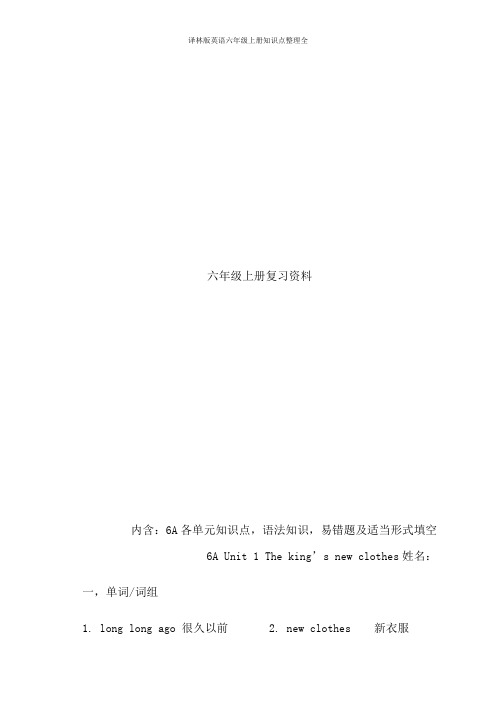
六年级上册复习资料内含:6A各单元知识点,语法知识,易错题及适当形式填空6A Unit 1 The king’s new clothes姓名:一,单词/词组1. long long ago 很久以前2. new clothes 新衣服3. make new clothes for you 为你制作新衣服make sth for sb4. show the king his new clothes给皇帝展示新衣服show sb. sth.= show sth. to sb.5. try on 试穿try on the coat=try the coat ontry it/them on6. magic clothes 有魔力的衣服7. walk through步行穿过8. in his new clothes 穿着他的新衣服9. shout at sb. 对某人大叫10. laugh at sb. 对某人大笑11. look at看….12. point at指向…13. fit well 非常适合 14. an American cowboy 一个xxxx15. a Scottish man 一位苏格兰人16. tell a story讲一个故事17. say a/one sentence 说一句话 18. on the mountain 在山上19. the next sentence 下一句话 20. live in the house住在房子里21. tell the boy a story 给这个男孩讲一个故事tell sb. sth.22. it is one’s turn某人的机会23. think hard 努力思考24. have to 不得不have to do sth.25. in front of 在….前面(外部) in the front of 在… 前面(内部)26. walk by 路过27. be nice to sb. 对某人好28. look after 照顾29. turn into 变成二,句型1. Long long ago, there was a king. 很久很久以前,有一位国王。
Unit3 Cartoon time (练习及解析)译林版(三起)-六年级英语上册

【精品】Unit3 Cartoon time (练习及解析)译林版(三起)-六年级英语上册一、翻译词组。
1. 举办一个时装表演___________________2. 一件纸T恤___________________3. 进展顺利___________________4. 大雨___________________5. 开始,最初___________________6. 到家___________________7. 激动地,兴奋地___________________ 8. 纸短裤___________________9. 许多瓶子___________________ 10 太糟糕___________________二、用所给词的正确形式填空。
1. He _____________ (bring) me some animal stamps three days ago.2. —Do you like ________ (fly) kites?—Yes, I _________(fly) a kite yesterday.3. They _________ (have) a fashion show last week.4. It _________ cold yesterday, but we didn’t __________ (wear) any coats.5. —Did you _________ (catch) any butterflies ?—Yes, I did.6. The party was wonderful and it ____________ (go) well.三、根据所给中文提示补全句子。
1. I visited Palace Museum last _________________ (国庆节).2. We usually go swimming on summer _______________ (假期).3. The cartoon is interesting. They are ______________ (兴奋的).4. She _________ (穿) a ____________ (纸) skirt and danced on the fashion show.5. The show went well _____________________ (起初).四、单项选择。
2024年译林版英语六年级上册全册课件【完整版】

2024年译林版英语六年级上册全册课件【完整版】一、教学内容本课件基于2024年译林版英语六年级上册全册教材,详细内容包括:1. Unit 1: Public signs (第14课时)知识点:公共场所标识的认识,祈使句的运用章节内容:第1章公共标识,第2章祈使句2. Unit 2: Western festivals (第58课时)知识点:西方节日文化,一般将来时的运用章节内容:第3章西方节日,第4章一般将来时3. Unit 3: Habitats (第912课时)知识点:动植物的栖息地,现在进行时章节内容:第5章栖息地,第6章现在进行时4. Unit 4: Keep fit (第1316课时)知识点:健康生活,一般现在时的运用章节内容:第7章健康生活,第8章一般现在时二、教学目标1. 让学生掌握基本的公共标识,学会使用祈使句进行表达。
2. 了解西方节日文化,学会运用一般将来时描述节日活动。
3. 认识动植物的栖息地,掌握现在进行时的用法。
4. 培养学生的健康意识,学会用一般现在时描述生活习惯。
三、教学难点与重点1. 教学难点:祈使句、一般将来时、现在进行时、一般现在时的运用。
2. 教学重点:公共标识、西方节日文化、动植物的栖息地、健康生活。
四、教具与学具准备1. 教具:PPT课件、卡片、挂图等。
2. 学具:教材、练习册、彩笔、剪刀、胶水等。
五、教学过程1. 实践情景引入:通过展示公共场所的标识,引导学生学习祈使句。
2. 例题讲解:讲解祈使句的构成及用法,举例说明。
3. 随堂练习:让学生练习编写祈使句,并在实际场景中运用。
4. 情景剧:分组进行角色扮演,模拟公共场合使用祈使句。
5. 节日文化介绍:通过PPT展示,介绍西方节日,学习一般将来时。
6. 例题讲解:讲解一般将来时的构成及用法,举例说明。
7. 随堂练习:让学生练习描述节日活动,运用一般将来时。
8. 栖息地学习:展示动植物的栖息地图片,引导学生学习现在进行时。
六年级上册英语优质教案- Unit3 Holiday fun Story time |译林版(三起)
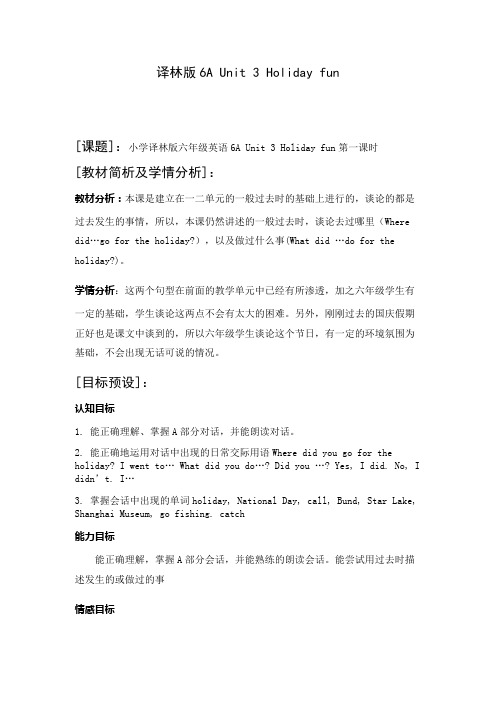
译林版6A Unit 3 Holiday fun[课题]:小学译林版六年级英语6A Unit 3 Holiday fun第一课时[教材简析及学情分析]:教材分析:本课是建立在一二单元的一般过去时的基础上进行的,谈论的都是过去发生的事情,所以,本课仍然讲述的一般过去时,谈论去过哪里(Where did…go for the holiday?),以及做过什么事(What did …do for the holiday?)。
学情分析:这两个句型在前面的教学单元中已经有所渗透,加之六年级学生有一定的基础,学生谈论这两点不会有太大的困难。
另外,刚刚过去的国庆假期正好也是课文中谈到的,所以六年级学生谈论这个节日,有一定的环境氛围为基础,不会出现无话可说的情况。
[目标预设]:认知目标1. 能正确理解、掌握A部分对话,并能朗读对话。
2. 能正确地运用对话中出现的日常交际用语Where did you go for the holiday? I went to… What did you do…? Did you …? Yes, I did. No, I didn’t. I…3. 掌握会话中出现的单词holiday, National Day, call, Bund, Star Lake, Shanghai Museum, go fishing. catch能力目标能正确理解,掌握A部分会话,并能熟练的朗读会话。
能尝试用过去时描述发生的或做过的事情感目标1. 让学生感到用英语开启话轮询问假期生活很有意义。
2. 让学生懂得乡村的宁静美,城市的繁华美.学会欣赏美。
做到文明旅游,懂得言谈之礼、行走之礼、观赏之礼等。
[重、难点]:重点1. 能听懂,会说,会读和会拼写holiday, National Day, Bund, Star Lake, Shanghai Museum, call, go fishing. catch2. 能听懂,会说,会读句型Where did you go? What did you do…? Did you …? Yes, I did. No, I didn't…难点1. 一般过去时的疑问句2. 特殊疑问句[设计理念]:在教学中,我从学生的已有储备的知识和生活实际出发,从多方面考虑,在教学设计中,突出课程标准中以“学生为本”的课程理念,设计贴近学生的学习实际和生活实际.运用多种媒体,营造创造学习语境,启动学生多种器官,针对不同层次的学生设计教学及作业。
六年级上英语课课练-Unit3It was there Period 3-译林版
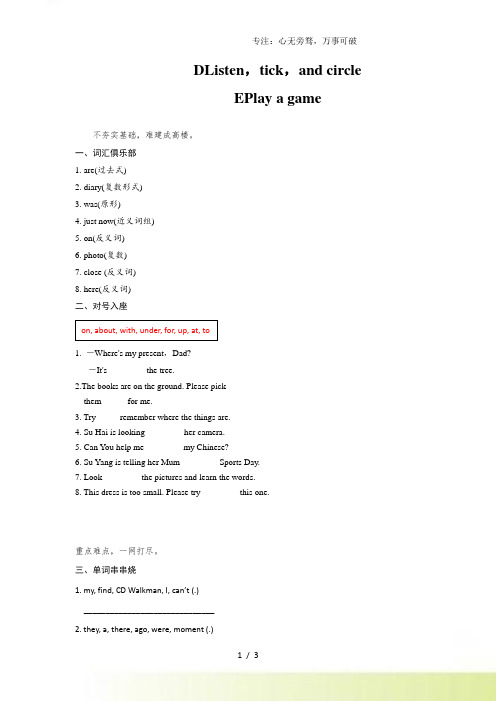
DListen,tick,and circleEPlay a game不夯实基础,难建成高楼。
一、词汇俱乐部1. are(过去式)______________2. diary(复数形式)________________3. was(原形)_____________4. just now(近义词组)______________5. on(反义词)________________6. photo(复数)______________7. close (反义词)____________8. here(反义词)_____________二、对号入座on, about, with, under, for, up, at, to1. -Where's my present,Dad?-It's ________ the tree.2.The books are on the ground. Please pickthem______for me.3. Try _____remember where the things are.4. Su Hai is looking ________ her camera.5. Can You help me ________ my Chinese?6. Su Yang is telling her Mum ________ Sports Day.7. Look ________ the pictures and learn the words.8. This dress is too small. Please try ________ this one.重点难点,一网打尽。
三、单词串串烧1. my, find, CD Walkman, I, can’t (.)______________________________2. they, a, there, ago, were, moment (.)______________________________3. are, race, they, running, watching, the (.)______________________________4. now, glasses, the, are, red, in, box, the (.)______________________________四、补全对话A: Where’s my camera?B: _________________.A: Let me see. No, i t isn’t here.B: _________________ Where is it now?A: Is it in your bag?B: Let me see. Oh, yes, it is.A: _________________B: _________________A: Can I have them, please?B: Oh, no! The y aren’t in my bag._____________.A. Where are the films?B. It was there a moment ago.C. It’s in your bag.D. They were here just now.E. They’re in my bag.举一反三,应用创新,方能一显身手!五、快乐阅读Come and see my sitting-room, please. There are a lot of things in it. Look!This is a pair of glasses. They’re on the chair now. They’re my grandpa’s. That’s my father’s mobile phone. I t’s on the sofa now, but it was in his bag just now. And the CD Walkman beside the mobile phone is very beautiful. My mother likes it very much because(因为)she likes listening to music. There are some CDs beside it. Oh, where’s my diary? Ah, it’s on the floor now. I must go and pick it up.根据短文内容,判断正(√)误(×)。
专项01 Unit 3 重点词汇精练(首字母+词的适当形式+选词填空)六年级英语寒假专项提升(译林版
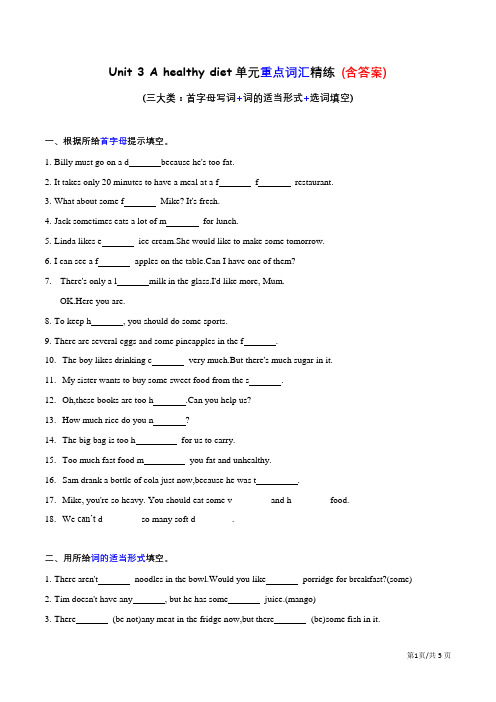
Unit 3 A healthy diet单元重点词汇精练(含答案)(三大类:首字母写词+词的适当形式+选词填空)一、根据所给首字母提示填空。
1.Billy must go on a d because he's too fat.2.It takes only 20 minutes to have a meal at a f f restaurant.3.What about some f Mike? It's fresh.4.Jack sometimes eats a lot of m for lunch.5.Linda likes e ice cream.She would like to make some tomorrow.6.I can see a f apples on the table.Can I have one of them?7.--There's only a l milk in the glass.I'd like more, Mum.--OK.Here you are.8.To keep h , you should do some sports.9.There are several eggs and some pineapples in the f .10.The boy likes drinking c very much.But there's much sugar in it.11.My sister wants to buy some sweet food from the s .12.Oh,these books are too h .Can you help us?13.How much rice do you n ?14.The big bag is too h for us to carry.15.Too much fast food m you fat and unhealthy.16.Sam drank a bottle of cola just now,because he was t .17.Mike, you're so heavy. You should eat some v________ and h________ food.18.We can’t d________ so many soft d________.二、用所给词的适当形式填空。
Unit3单元语法练习--动词_ing形式作定语,状语和宾补2020-2021学年牛津译林版必修第三
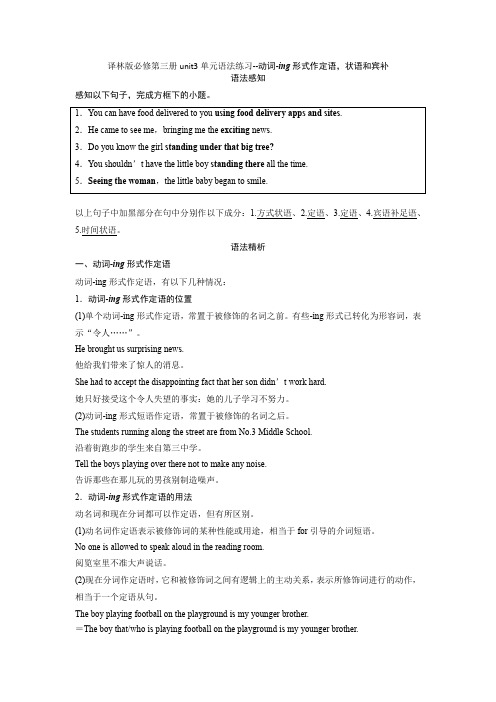
译林版必修第三册unit3单元语法练习--动词ing形式作定语,状语和宾补语法感知感知以下句子,完成方框下的小题。
以上句子中加黑部分在句中分别作以下成分:1.方式状语、2.定语、3.定语、4.宾语补足语、5.时间状语。
语法精析一、动词ing形式作定语动词ing形式作定语,有以下几种情况:1.动词ing形式作定语的位置(1)单个动词ing形式作定语,常置于被修饰的名词之前。
有些ing形式已转化为形容词,表示“令人……”。
He brought us surprising news.他给我们带来了惊人的消息。
She had to accept the disappointing fact that her son didn’t work hard.她只好接受这个令人失望的事实:她的儿子学习不努力。
(2)动词ing形式短语作定语,常置于被修饰的名词之后。
The students running along the street are from No.3 Middle School.沿着街跑步的学生来自第三中学。
Tell the boys playing over there not to make any noise.告诉那些在那儿玩的男孩别制造噪声。
2.动词ing形式作定语的用法动名词和现在分词都可以作定语,但有所区别。
(1)动名词作定语表示被修饰词的某种性能或用途,相当于for引导的介词短语。
No one is allowed to speak aloud in the reading room.阅览室里不准大声说话。
(2)现在分词作定语时,它和被修饰词之间有逻辑上的主动关系,表示所修饰词进行的动作,相当于一个定语从句。
The boy playing football on the playground is my younger brother.=The boy that/who is playing football on the playground is my younger brother.在操场上踢足球的那个男孩是我的弟弟。
六年级英语上册教案Unit3Holidayfun第三课时译林版

教案:六年级英语上册Unit 3 Holiday fun第三课时译林版一、教学目标1. 知识目标(1)能够听懂、会说、会读本课时出现的关键词语:go to a farm, go to the seaside, go hiking, take photos, visit family, have a picnic, play with friends等。
(2)能够理解并在适当的情境中运用一般过去时描述自己的假期经历。
(3)能够通过图片和情景,理解课文内容,提高阅读理解能力。
2. 能力目标(1)能够运用所学知识进行简单的交流,如询问和描述假期活动。
(2)能够通过阅读提高自己的词汇量和语言运用能力。
3. 情感目标培养学生的团队协作精神,学会分享和倾听。
二、教学内容本课时的主要内容是学习一般过去时,以及相关的假期活动词汇。
通过阅读一篇关于假期生活的故事,让学生理解一般过去时的用法,并能够运用到实际情景中。
三、教学重点与难点1. 教学重点(1)掌握一般过去时的基本结构和用法。
(2)学会本课时出现的假期活动词汇,并能熟练运用。
2. 教学难点(1)一般过去时的被动语态。
(2)如何正确运用一般过去时描述假期活动。
四、教具与学具准备1. 教具:PPT、黑板、粉笔、录音机、磁带等。
2. 学具:课本、练习册、铅笔、橡皮等。
五、教学过程1. 热身(5分钟)(1)老师与学生用英语进行简单的交流,询问学生们的假期生活。
(2)学生进行小组活动,用英语分享彼此的假期经历。
2. 课堂导入(10分钟)(1)老师通过PPT展示本课时的关键词语,引导学生复习假期活动词汇。
(2)学生跟读,巩固词汇。
3. 阅读理解(15分钟)(1)老师引导学生阅读课文,理解课文内容。
(2)学生回答老师提出的问题,加深对课文的理解。
4. 语法讲解(10分钟)(1)老师讲解一般过去时的基本结构和用法。
(2)学生跟读,掌握一般过去时的发音。
5. 实践环节(10分钟)(1)学生分成小组,用一般过去时描述彼此的假期活动。
高中英语牛津译林版(2020)必修第三册 Unit3 语法练习题含答案

Unit3 语法练习题I 单项选择1.He sent me an email, ______ to get further information.A.hopedB. hopingC. to hopeD. hope2.— I must apologize for _______.— That’s all right.A.Letting you not knowB. not letting you knowC.letting you know notD. letting not you know3. Only one of these books is _______.A. worth to readB. worth being readC. worth of readingD. worth reading4. Tony was very unhappy for _______ to the party.A. having not bee invitedB. not having invitedC. having not invitedD. not having being invited5. _______ all the time is the key to _______ progress in English.A. Practising, makeB. To practise, makingC. Practise, makeD. To practise, make6. As I will be away for at least a year, I’d appreciate from you now and then me how everyone is getting along.A. hearing; tellB. to hear; tellC. hearing; tellingD. to hear; to tell7. A cook will be immediately fired if he is found _______ in the kitchen.A. smokeB. smokingC. to smokeD. smoked8. The policeman put down the phone, _______ with a smile on his face.A. satisfiedB. satisfyingC. to be satisfiedD. having satisfied9. The murderer was brought in, with his hands ________ behind his back.A. being tiredB. having tiredC. to be tiredD. tired10. On Saturday afternoon, Mr Smith went to the market, ______ some grapes and visited his cousins.A. to buyB. buyingC. boughtD. buy【答案】1-5 BBDDB6-10 CBADCII 判断下列句子中的动词ing部分作哪种成分1.Would you mind carrying the suitcase for us. _______2.What worries me most is her staying too late every night. _______3.They lived in a house facing south. _______4.When we returned, we found a stranger standing in front of the house. _______5.The film is found very exciting. _______6.It is no use serving up TV dinners if the kids won’t eat them. _______7.I’m sorry for not having told you the news earlier. _______8.Not knowing his address, I can’t send this book to him. _______9.She came into the house, carrying a lot of books. _______10. Seeing those pictures, she remembered her childhood. _______ 【答案】1. 宾语;2. 表语;3. 定语;4. 宾语补足语;5.主语补足语;6. 主语;7. 宾语;8. (原因)状语;9.(伴随)状语;10. (时间)状语III 按要求完成下列句子1.It rained heavily in the south. As a result, it caused serious flooding in several provinces. (用动词ing合并句子)__________________________________________________________________2.We had an anxious couple of weeks during which we waited for the results of the experiment. (用动词ing改写句子)__________________________________________________________________3.If you work hard enough, you will get academic success sooner or later. (用动词ing改写句子) __________________________________________________________________4.Weighing almost one hundred kilos, the stone was moved by him alone. (改成状语从句)__________________________________________________________________5.The tall building being built now is our new school. (改成定语从句)__________________________________________________________________6.My heart was pounding with excitement. (同义句转换)I felt ______________________________________________________________7.She stared blankly into space, and didn’t know what to say next. (同义句转换)She stared blankly into space, __________________________________________8.为了种种小毛病去看医生是浪费时间。
2024年译林版英语六年级上册全册精彩课件【完整版】

2024年译林版英语六年级上册全册精彩课件【完整版】一、教学内容本课件依据2024年译林版英语六年级上册全册教材,详细内容包括:1. 教材章节:Unit 1Unit 6,涵盖各单元的A、B部分;2. 详细内容:重点词汇、语法、日常用语、阅读理解、写作技巧等。
二、教学目标1. 掌握并运用各单元的重点词汇和语法;3. 增进学生对英语文化的了解,激发学习英语的兴趣。
三、教学难点与重点1. 教学难点:时态语法的运用、阅读理解的提高、写作技巧的掌握;2. 教学重点:词汇的积累、日常用语的熟练运用、听说读写能力的提升。
四、教具与学具准备1. 教具:PPT课件、教学光盘、实物、卡片等;2. 学具:课本、练习册、笔记本、彩色笔等。
五、教学过程1. 导入:通过实践情景引入,激发学生的学习兴趣;2. 新课内容:讲解重点词汇、语法、日常用语等,结合例题进行讲解;3. 随堂练习:设计相关练习题,巩固所学知识;4. 互动环节:小组讨论、角色扮演等,提高学生的听说能力;6. 作业布置:布置适量作业,巩固所学知识。
六、板书设计1. 重点词汇:用不同颜色标注,突出重点;2. 语法:用简洁明了的例子展示;3. 阅读理解:列出文章框架,标注关键信息;4. 写作技巧:给出写作模板,指导学生运用。
七、作业设计1. 作业题目:a. 单词拼写:根据课文内容,拼写重点词汇;b. 句子翻译:将课文中的重点句子翻译成中文;c. 阅读理解:完成一篇与课文相关的阅读理解题;d. 写作练习:根据模板,完成一篇短文写作。
答案:略。
八、课后反思及拓展延伸1. 反思:对本节课的教学效果进行自我评价,找出不足之处,以便改进;2. 拓展延伸:推荐相关英语学习资料,鼓励学生自主学习,提高英语水平。
本课件以严谨的用词、流畅的段落衔接,结合实践情景引入、例题讲解、随堂练习等环节,旨在帮助学生在轻松愉快的氛围中学习英语,提高英语素养。
重点和难点解析1. 教学内容的详细规划和组织;2. 教学目标的明确和具体化;3. 教学难点与重点的识别;4. 教具与学具的准备与应用;5. 教学过程中的互动和实践活动设计;6. 板书设计的逻辑性和清晰度;7. 作业设计的针对性和拓展性;8. 课后反思与拓展延伸的实际操作。
牛津译林版初中英语9aunit3teenageproblems语法知识点及相关习题
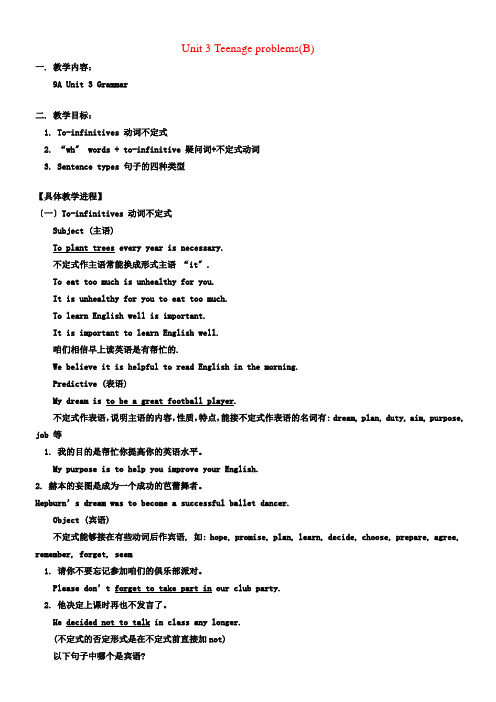
Unit 3 Teenage problems(B)一. 教学内容:9A Unit 3 Grammar二. 教学目标:1. To-infinitives 动词不定式2. “wh〞 words + to-infinitive 疑问词+不定式动词3. Sentence types 句子的四种类型【具体教学进程】〔一〕To-infinitives 动词不定式Subject (主语)To plant trees every year is necessary.不定式作主语常能换成形式主语“it〞.To eat too much is unhealthy for you.It is unhealthy for you to eat too much.To learn English well is important.It is important to learn English well.咱们相信早上读英语是有帮忙的.We believe it is helpful to read English in the morning.Predictive (表语)My dream is to be a great football player.不定式作表语,说明主语的内容,性质,特点,能接不定式作表语的名词有: dream, plan, duty, aim, purpose, job 等1. 我的目的是帮忙你提高你的英语水平。
My purpose is to help you improve your English.2. 赫本的妄图是成为一个成功的芭蕾舞者。
Hepburn’s dream was to become a successful ballet dancer.Object (宾语)不定式能够接在有些动词后作宾语, 如: hope, promise, plan, learn, decide, choose, prepare, agree, remember, forget, seem1. 请你不要忘记参加咱们的俱乐部派对。
2019-2020学年译林版英语选修六新素养同步练习:Unit 3 Understanding each other Section Ⅳ 知能演练轻
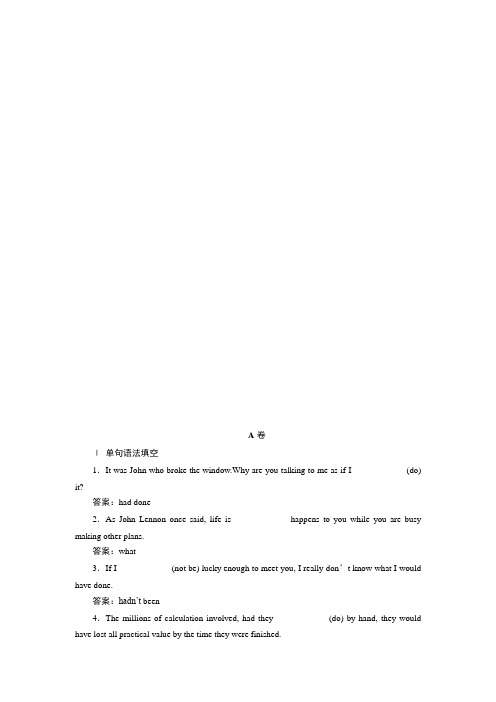
A卷Ⅰ单句语法填空1.It was John who broke the window.Why are you talking to me as if I ____________(do) it?答案:had done2.As John Lennon once said, life is ____________ happens to you while you are busy making other plans.答案:what3.If I ____________(not be) lucky enough to meet you, I really don’t know what I would have done.答案:hadn’t been4.The millions of calculation involved, had they ____________(do) by hand, they would have lost all practical value by the time they were finished.答案:been done5.If I ____________(be) you,I would do it in another way.答案:were6.If he____________(take) my advice,he would have succeeded in the competition.答案:had taken7.Can you imagine what difficulty people had this year ____________(fight) against the severe natural disasters?答案:fighting8.The reason why he failed the exam is ____________ he didn’t work hard.答案:that9.____________ it rain tomorrow, we should put off the match till next Friday.答案:Should10.When a pencil is partly put into a glass of water, it looks as if it ____________(break).答案:were brokenⅡ阅读理解When going through major life changes, like changing careers, I would change the people with whom I spent the most time. We’ve all gone through periods when the people in our lives have changed—graduation, moving to a new city, getting a new job, joining a new club, etc. I don’t think I need to convince you just how much influence other people can have over your identity. If you’ve ever experienced a major switch in your people environment, then you know that you change as well.Most people don’t make these choices consciously(意识到地) though.You might consciously decide to spend more time with a certain friend, or you may ask someone out on a date to begin a new relationship. But few people choose their existing friendships deliberately.There’s__no__“getting__rid__of__people”.People are always dropping into and out of each other’s lives. Associations grow into friendships, and friendships fade into associations. You don’t get rid of anyone. The truth is that in order to make room for new people and new experiences, you may need to loosen up some of your existing connections.What about loyalty(忠诚)? Shouldn’t you always be loyal to your friends? Once you have a close friend, even if his influence on you is slightly harmful, shouldn’t you stick by them?Loyalty to a friend sometimes means having to let go.It means being loyal to their highest and best self as well. If someone is destroying his health by smoking, for example, you aren’t showing loyalty by smoking right along with him.True loyalty sometimes requires that you break damaging connections, get yourself back on solid ground, and then decide what you can really do to help your friend.It can take a lot of courage to tell someone,“I’m sorry, but I can’t have you in my lifeanymore.”But even though this might seem like a selfish act at times, it’s often the best thing for the other person too. If a relationship is holding you back in some way, understand that it’s also hurting the other person. For example, if you work for a violent boss, your acceptance of that situation is considered to be silent approval, encouraging your boss to continue to behave violently.【解题导语】本文讲述了人的一生会经历很多的改变,从而告诉我们:如何适应改变以及怎样做才是对朋友真正的忠诚。
译林版六年级英语上下册重点及典型试题

苏教版译林版英语六年级上册知识点汇总及典型试题Unit 1 The king’s new clothes一,单词/词组1. long long ago 很久以前2. new clothes 新衣服3. make new clothes for you 为你制作新衣服make sth for sb4. show the king his new clothes给皇帝展示新衣服show sb. sth.= show sth. to sb.5.try on 试穿try on the coat=try the coat on try it/them6. magic clothes 有魔力的衣服7. walk through步行穿过8. in his new clothes 穿着他的新衣服9. shout at sb. 对某人大叫 10. laugh at sb. 对某人大笑11. look at 看….12. point at 指向…13. fit well 非常适合14. an American cowboy 一个美国牛仔15. a Scottish man 一位苏格兰人16. tell a story 讲一个故事17. say a/one sentence 说一句话18. on the mountain 在山上19. the next sentence 下一句话20. live in the house 住在房子里21. tell the boy a story 给这个男孩讲一个故事tell sb. sth.22. it is one’s turn 某人的机会23. think hard 努力思考24. have to 不得不have to do sth.25. in front of 在….前面(外部)in the front of 在… 前面(内部)26. walk by 路过27. be nice to sb. 对某人好28. look after 照顾29. turn into 变成二,句型1. Long long ago, there was a king. 很久很久以前,有一位国王。
(译林版)6AUnit3单词、词组、句型、语法和单元检测卷

(译林版)6AUnit3单词、词组、句型、语法和单元检测卷Unit three【词汇】1. holiday 假⽇,假期2. National Day 国庆节3. call 打电话4. bund (上海)外滩5. Shanghai Museum 上海博物馆6. star 星星7. Great Wall 长城8. Palace Museum 故宫9. Summer Palace 颐和园10. Tian’anmen Square 天安门⼴场11. fashion show 时装表演12. excited 激动的,兴奋的13. paper 纸14. ask 问15. bottle 瓶⼦16. go well 进展顺利17. at first 开始,最初18. heavy rain ⼤⾬19. museum 博物馆20. square ⼴场21. lake 湖泊22. fashion时尚的,时髦的23. cool 酷,真棒注:红⾊单词为旧教材3A——5B没有的⽽本课中出现的⽣词。
【词组或短语】1. National Day 国庆节2. (the) Shanghai Museum 上海博物馆3. (the) Great Wall 长城4. (the) Palace Museum 故宫5. (the) Summer Palace 颐和园6. Tian’an men Square 天安门⼴场7. fashion show 时装表演,时装秀8. go well 进展顺利9. at first 开始,最初10.heavy rain ⼤⾬11. holiday fun 假⽇快乐12. come back to school回到学校13. after the National Day holiday国庆假⽇之后14. call you打电话给你15. at home 在家16. go to Shanghai去上海17. visit my aunt拜访我的阿姨18. go to the Bund去外滩19. visit the Shanghai Museum参观上海博物馆20. see many interesting things看见许多有趣的事21. How was your holiday? 你的假⽇怎么样22. great fun有趣的事23. our family我们全家24. go to a farm去农场25. near Star Lake在星星湖边26. pick some oranges摘⼀些橘⼦27. go fishing去钓鱼28. catch a big fish钓了⼀条⼤鱼29. want to give you the fish想要把鱼给你30. pick an orange for me为我摘只橘⼦31. talk about your travel experiences 谈论你的旅游经历32. want an orange from the tree想要树上的⼀只橘⼦33. three main school holidays三个主要的学校假⽇34. in the UK在英国35. the Easter holiday复活节假期36. the summer holiday暑假37. the Christmas holiday圣诞假期38. It is time for dinner. 该吃晚饭了。
牛津译林版六年级上册《单元3 Holiday fun》小学英语-有答案-同步练习卷(2)
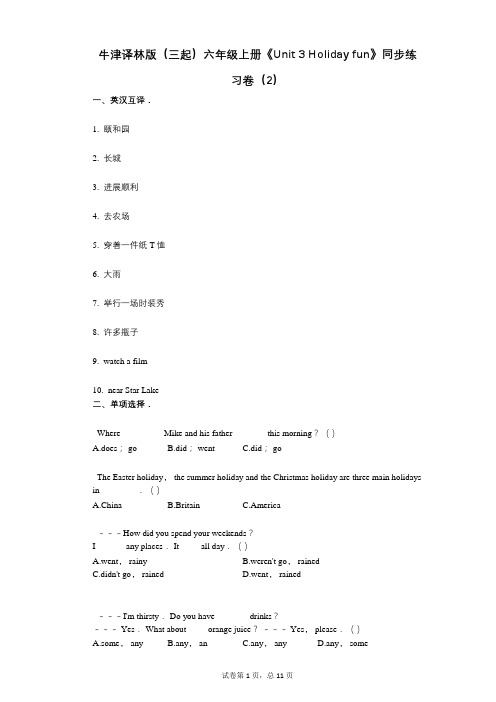
牛津译林版(三起)六年级上册《Unit 3 Holiday fun》同步练习卷(2)一、英汉互译.1. 颐和园________2. 长城________3. 进展顺利________4. 去农场________5. 穿着一件纸T恤________6. 大雨________7. 举行一场时装秀________8. 许多瓶子________9. watch a film________10. near Star Lake________二、单项选择.Where _________ Mike and his father _______ this morning?()A.does; goB.did; wentC.did; goThe Easter holiday, the summer holiday and the Christmas holiday are three main holidays in ________.()A.ChinaB.BritainC.America﹣﹣﹣How did you spend your weekends?I ______ any places. It ____ all day.()A.went, rainyB.weren't go, rainedC.didn't go, rainedD.went, rained﹣﹣﹣I'm thirsty. Do you have _______ drinks?﹣﹣﹣ Yes. What about ____ orange juice?﹣﹣﹣ Yes, please.()A.some, anyB.any, anC.any, anyD.any, some﹣﹣﹣We had a picnic_____ National Day.()A.onB.atC.inD.for三、用所给词的适当形式填空.Who________ (come) home late yesterday.We________ (not go)________ (skate) last Sunday.She________ (eat) an apple every day.I'd like________ (call) your sister, Helen.Where________you last night? I________ in Suzhou.(be)Listen! The children________ (listen) to music in the classroom.My brother often________(fly) kites in the park on Sunday.Mike could________ (pick) many oranges on the farm last week.四、按要求完成下列句子.I went to ________ this morning.(对划线部分提问)________you________ this morning?David eats some oranges on the farm every year.(用last year改成句子)David________.She got a postcard from her e﹣friend last Sunday.(改为否定句)She________ a postcard from her e﹣friend last Sunday.saw, interesting, I, many, in, things, Bund, the (.)(连词成句)________I caught some fish.(改为一般疑问句)________ you________any fish?五、阅读短文,判断下列各句是否正确,正确的打T,错误的打F.阅读短文,判断下列各句是否正确,正确的打T,错误的打F.Mr. Black had two cats. One was big and the other was small. He liked them very much. One day his friend Mr. Green came to see him. He was very surprised. He found there were two holes(洞) in the door, a big hole and a small one. He said, "My friend, why are there two holes in your door?" "To let them in and out," Mr. Black answered. "But why are there two holes?" asked his friend. "How can the big cat go(1)Mr. Green had two cats.________(2)Mr. Green came to see the cats.________(3)There were two holes in the door.________(4)The small cat could go through the big hole.________ (5)Mr. Black is very clever.________参考答案与试题解析牛津译林版(三起)六年级上册《Unit 3 Holiday fun》同步练习卷(2)一、英汉互译.1.【答案】The Summer Palace【考点】翻译能力【解析】The Summer Palace【解答】该题考查短语翻译.颐和园The Summer Palace故答案为:The Summer Palace.2.【答案】the Great Wall【考点】翻译能力【解析】the Great Wall长城.【解答】本题考查短语翻译.the Great Wall长城,固定搭配.故答案为:the Great Wall.3.【答案】go well【考点】翻译能力【解析】go well进展顺利.【解答】本题考查短语翻译.go well进展顺利,固定搭配.故答案为:go well.4.【答案】go to the farm【考点】翻译能力【解析】考查短语翻译."去农场"译为:go to the farm.故答案为:go to the farm.5.【答案】wear a paper T﹣shirt【考点】翻译能力【解析】wear a paper T﹣shirt.【解答】考查短语翻译."穿着一件纸T恤"译为:wear a paper T﹣shirt.故答案为:wear a paper T﹣shirt.6.【答案】heavy rain【考点】翻译能力【解析】heavy rain.【解答】考查短语翻译."大雨"译为:heavy rain.故答案为:heavy rain.7.【答案】hold a fashion show【考点】翻译能力【解析】hold a fashion show.【解答】考查短语翻译."举行一场时装秀"译为:hold a fashion show.故答案为:hold a fashion show.8.【答案】many bottles【考点】翻译能力【解析】many bottles.【解答】考查短语翻译.'许多瓶子"译为:many bottles.故答案为:many bottles.看电影【考点】翻译能力Hobbies【解析】看电影【解答】考查短语翻译.watch观看,a film电影.故答案为:看电影.10.【答案】在明星湖附近【考点】翻译能力【解析】在明星湖附近.【解答】考查短语翻译.near Star Lake译为:在明星湖附近.故答案为:在明星湖附近.二、单项选择.【答案】C【考点】助动词动词原形【解析】迈克和他爸爸今天早晨去哪里了?【解答】考查助动词和动词原形,由this morning可知是一般过去式,所以助动词为do的过去是did,A错误,did后跟动词原形,B选项中went是go的过去式.故选:C.【答案】C【考点】名词【解析】复活节、暑假和圣诞节是美国三大节日.【解答】考查名词.A.China中国.B.Britain英国.C.America美国.根据The Easter holiday,the summer holiday and the Christmas holiday"复活节、暑假和圣诞节"可知,应该是"美国"的三大节日.故选:C.C【考点】一般过去时,动词过去式【解析】你怎么度过你的周末的?我哪里也没有去,一天都在下雨.【解答】考查一般过去时.问句问的是"你怎么度过你的周末的?",根据答语中的any可知第一个空用否定形式,排除A和D,weren't go不符合语法规则,排除,本题为一般过去时,用助动词do的形式与动词go构成否定,即didn't go;rained在此处做动词,是rain的过去式.故选:C.【答案】D【考点】形容词【解析】﹣﹣我渴了.你有饮料吗?﹣﹣是的.来点橙汁怎么样?﹣﹣是的,请.【解答】考查形容词.any任何的,通常用于否定句或一般疑问句.some一些,通常用于肯定句.第一个空,"你有饮料吗?",一般疑问句用any.第二个空,特殊疑问句,表示建议并希望得到对方的肯定回答用some.故选:D.【答案】A【考点】介词【解析】国庆节我们野餐了.【解答】考查介词.A.on在具体某一天.B.at在几点.C.in在某年某月.D.for为了.根据National Day"国庆节"可知,在具体某一天用介词on.故选:A.三、用所给词的适当形式填空.【答案】came【考点】单词、词组【解析】谁昨天回家晚了.【解答】本题考查单词填空.根据 yesterday,判断句子使用一般过去时,come的过去式是came.故答案为:came.【答案】didn't go,skating【考点】单词、词组【解析】上星期天我们没有去滑冰.【解答】本题考查单词填空.根据 last Sunday,判断句子使用一般过去时,go是实意动词,否定句需要加助动词didn't,go skating表示去滑冰.故答案为:didn't go,skating.【答案】eats【考点】单词、词组【解析】她每天吃一个苹果.【解答】本题考查单词填空.根据题干:every day用于一般现在时,主语是第三人称单数,谓语动词用第三人称单数形式eats.故答案为:eats.【答案】to call【考点】单词、词组【解析】我想打电话给你妹妹,海伦.【解答】本题考查单词填空.根据题干:句子考查would like to do sth表示想做某事.故答案为:to call.【答案】were,was【考点】单词、词组【解析】昨晚你在哪儿?我在苏州.【解答】本题考查单词填空.根据题干:last night用于一般过去时,you做作业,用were,I作主语用was.故答案为:were,was.【答案】【考点】单词、词组【解析】听!孩子们正在教室里听音乐.【解答】本题考查单词填空.根据题干:look用于现在进行时,构成be+Ving.故答案为:are listening.【答案】flies【考点】单词、词组【解析】我哥哥经常周日在公园放风筝.【解答】本题考查单词填空.主语为my brother,为第三人称单数,故谓语动词用第三人称单数形式flies.故答案为:flies.【答案】pick【考点】单词、词组【解析】迈克上周在农场摘了许多桔子.【解答】本题考查单词填空.根据题干:情态动词could后面跟动词原形pick.故答案为:pick.四、按要求完成下列句子.【答案】the Great Wall,Wheredid,go【考点】就划线部分提问【解析】今天上午我去了长城.你今天上午去哪儿了?【解答】考查特殊疑问句.特殊疑问句的结构:特殊疑问词+一般疑问句.句子的划线部分是the Great Wall,是地名,询问哪里,确定疑问词为Where,句子的剩余部分变成一般疑问句跟在后面,句子中有谓语动词的过去式 went,变一般疑问句用did引导,I变为you,went还原为go.用Where did you go this morning?提问.故答案为: Where;did;go.【答案】ate some oranges on the farm last year【考点】改写句子大卫每年都在农场吃一些橘子.大卫去年在农场吃了一些橘子.【解答】考查改写句子.由题,every year为一般现在时,改为last year后,时态变为一般过去时,动词eats改为过去式ate.故答案为:David ate some oranges on the farm last year.【答案】didn't get【考点】肯定句转否定句【解析】上星期天她收到了她的网友寄来的明信片.上星期天她没收到她的网友寄来的明信片.【解答】本题考查句型转换.题干句意:上星期天她收到了她的网友寄来的明信片.本句是一般过去时,got是实义动词,而且是动词过去式,助动词否定形式用didn't,后跟动词原形get.转为的否定句为:She didn't get a postcard from her e﹣friend last Sunday.故答案为:didn't get.【答案】IsawmanyinterestingthingsintheBund【考点】连词成句【解析】我在外滩看见了很多有趣的东西.【解答】考查句法结构,连词成句.根据句号可判断为陈述句.人称代词I做主语,唯一的动词saw做谓语动词,many interesting things做宾语,in the Bund在外滩,做地点状语.故答案为:I saw many interesting things in the Bund.【答案】Did,catch【考点】一般疑问句【解析】我抓到一些鱼.你抓到了一些鱼吗?【解答】考查一般疑问句.陈述句变为一般疑问句,要根据陈述句中动词使用适当的动词提前,并注意第一人称与第二人称的转化以及some、any的转化.由题,原句使用caught为实义动词catch的过去式,变为一般疑问句则用助动词的过去式即did提前,注意首词首字母要大写;前面使用了助动词,后面的实义动词变为原形,即catch.故答案为:Did,catch.五、阅读短文,判断下列各句是否正确,正确的打T,错误的打F.【答案】F,F,T,T,F判断正误【解析】Black先生有两只猫.一只是大的,另一只是小的.他非常喜欢它们.一天他的朋友Green先生来看他.他非常惊讶.他发现有两个洞在门上,一个大洞和一个小洞.他说,"我的朋友,为什么在你的门上有两个洞?""为了让它们进出,"Black先生回答."但是为什么有两个洞?"他的朋友问."大猫怎么可能从小洞穿过?"他说.【解答】考查对于文中细节信息的理解.(1)F.由文中Mr.Black had two cats.可知是Black先生而不是Green先生有两只猫.故答案为:F.(2)F.由文中One day his friend Mr.Green came to see him.可知Green先生是来看Black先生的,而不是来看猫的.故答案为:F.(3)T.由文中He found there were two holes in the door可知门上确实是有两个洞.故答案为:T.(4)T.由题,此处是指"小猫能从大洞通过",结合生活实际情况是符合的.故答案为:T.(5)F.由文中He found there were two holes in the door?可知Black先生知道大猫不能从小洞穿过,但是没有想到小猫能从大洞穿过,所以一个洞就可以了,可知Black先生并不聪明.故答案为:F.试卷第11页,总11页。
- 1、下载文档前请自行甄别文档内容的完整性,平台不提供额外的编辑、内容补充、找答案等附加服务。
- 2、"仅部分预览"的文档,不可在线预览部分如存在完整性等问题,可反馈申请退款(可完整预览的文档不适用该条件!)。
- 3、如文档侵犯您的权益,请联系客服反馈,我们会尽快为您处理(人工客服工作时间:9:00-18:30)。
六上Unit 3 讲义歌曲:《How is the weather?》How is the weather? It's a fine day.How is the weather? It's a cloudy day.How is the weather? It's raining.How is the weather? It's snowing.词组:holiday fun假期乐趣come back to school回到学校the National Day holiday国庆节假期at home回家go to Shanghai去上海visit my aunt拜访我的姑姑go to the Bund 去外滩visit the Shanghai Musuem参观上海博物馆many interesting things许多有趣的事our family我们的家人Star Lake星星湖pick some oranges摘一些橘子go fishing去钓鱼catch a big fish抓一条大鱼call me打电话给我;travel experiences 旅游经历want an orange想要一个橘子three main school holidays 三个主要的学校假期Easter holiday复活节假期(春假)the summer holiday暑假the Christmas holiday圣诞节假期(寒假)come home late回家晚in the park载公园里a fashion show一个时装展示beautiful clothes美丽的衣服be excited about激动于That’s cool.酷毙了What great fun!多开心啊a paper T-shirt一件纸体血衫a lot of bottles许多瓶子heavy rain大雨too bad太糟糕the Car Museum汽车博物馆cool cars酷车a birthday party一个生日聚会his cousin Jim他的表兄吉姆falling intonation降调句型:What did you do for the holiday?假期你做什么了?I visited the Shanghai Museum.我参观了上海博物馆。
Did you go fishing?你钓鱼了吗?No, I didn’t.不,没有。
语法:1、特殊疑问词:What?什么Where?在哪(回答:介词+地点)When?何时(回答:介词+时间)Who?谁Why?为什么(Because 开头回答)How?怎样How old?多少岁How many?多少个How much?多少钱What about?怎么样What day?问星期What date?问日期2、一句中一个过去式(除非用and连接),句子中有助动词do和情态动词,过去式加在它们身上,后面的动词用原型。
3、It’s time for+名词。
It’s time to+动词。
4、excite兴奋(动)人用ed(excited人兴奋), 物用ing(exciting 令人兴奋的)例子:Tom was very excited this morning. This is an exciting book.5、不规则过去式:wear(wore)catch(caught)一、英汉互译。
大雨一场精彩时装表演假期乐趣打电话给她问我关于山姆许多瓶子国庆节假期摘苹果天安门广场穿纸衣服二、选出划线部分读音与所给单词相同的一项。
A.B.C.()1. national A. want B. day C. palace()2. fish A. like B. lion C. give()3. take A. cake B. tap C. cat()4. tree A. see B. bed C. lesson()5. holiday A. go B. hot C. zoo三、用所给词的适当形式填空。
1. Su Yang (call) me every Sunday.2. Mary (eat) lots of nice food last night.3. (do) you have a party last National Day?4. I’d like (wear) the paper clothes.5. There is a lot of (rain) here in summer.6. Where did you (go) for the weekend.7. We (catch) a big fish last week.8. It (be) sunny yesterday.9. My father likes (fish) very much.10. Mary is (exciting) about the fashion show.11. Bobby (wear) a T-shirt at that time.12. How (be) your last summer holiday?13. Mike usually (go) (fish) with his family.14. I want to (give) you some (apple).15. I (go) to Beijing and (visit) the Great Wall last year.四、根据中文提示完成下列句子。
1、你的家人在假期做了什么?What your family the ?2、你去农场摘橙子了吗?you oranges the ?3、你去年为什么想去北京?you go to Beijing last year?4、上周我们摘了些橙子也去钓了鱼。
We some and last week.5、你在博物馆看到了一些有趣的事吗?you interesting things in the ?6、你去哪里度假了?Where you go the ?7、我很喜欢吃鱼。
昨天我吃了很多。
I like very much. I a lot yesterday.8、“你去年参观故宫了吗?”“是的。
我看到了许多有趣的东西。
”you the Palace Museum last year?Yes. I interesting things.9、“海伦为什么打电话给你?”“她想要给我一些邮票。
”Why Helen you?She some stamps.10、“学生们上周末去了哪里?”“他们去了一个农场。
”“他们在那里做了什么?”“他们摘了橙子也钓了鱼。
”Where the go last weekend?They to a .they do there?They and .11、我去南京拜访了我的叔叔。
I to Nanjing and my .12、你的爸爸捉了一些鱼吗?your father ?13、你昨天为什么打电话给我们?you yesterday?14、今天早上我吃了许多面包。
I morning.15、国庆节假期后学生们都会到学校。
The students school after the National Day .五、完形填空。
A French student went to London for his holiday. He thought, “I konw just 1English. But I think people can understand me.”One day he went 2 a restaurant and sat down at a table. He wanted to 3a cup of tea and some eggs. Soon the waiter came up to him and asked, “Can I help you?”“A cup of tea...” He could not remember the 4 word for egg. He looked 5 , but nobody was eating eggs. Then he saw an 6 book on the table next to him. There was a picture of 7 on its cover. He 8 the picture to the waiter, “What’s this in English?”“A cock,” answered the waiter. “What do you call a cock’s wife?”he asked again. “A hen.”“And what do you call their children?”“Chicks.”“And what do you call chicks 9 they are born?”“Eggs.”“Bring me two 10 and a cup of tea, please, ” said the French student happily.( )1. A. much B. a little C. more ( )2. A. up B. into C. out ( )3. A. drink B. take C. have ( )4. A. French B. Chinese C. English ( )5. A. at B. around C. after ( )6. A. English B. Chinese C. history ( )7. A. a cook B. a girl C. a child ( )8. A. read B. put C. showed ( )9. A. when B. before C. where ( )10. A. hens B. chicks C. eggs。
